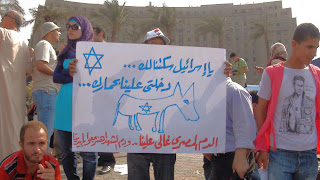 |
| Gamal al-Banna at his office 14 June 2012 |
When I walked out of the office at Sharia al-Geish on 14 June 2012, something had changed. It felt as if a door that seemed eternally open, lost in time and space, irrevocably closed behind my back.
Since our first meeting on 21 August 2007, Gamal al-Banna was one of the personalities who most impressed me and marked my thoughts and life. His office, library and home were situated in the middle of a busy and popular area where taxi drivers usually told me off for not exactly knowing the location and forcing them into the hassle of the overcrowded one-way streets. “Mʿalish, I can walk from here,” I would say and give the driver an extra pound. I found refuge from the honking cars and the burning sun as soon as I entered the old building and tried to control my breath while walking up the stairs. From the door I was guided through a small corridor to the heart of the apartment: Gamal al-Banna’s office.
Very modestly, dressed in what looked like a worker's overall, surrounded by thousands of books sat a man who had dedicated his whole life to thought and only thought. He welcomed me and sat next to me on the green coach. He looked at me with small lively eyes and excused himself for his English. However, his thoughts mastered all kinds of language barriers, the philosopher did not talk in vain, all his words were duly selected, thought through and eloquently referenced by religious or secular sources. He finished by dictating me out of his mind a complete article which did not need further editing.
When talking about his brother Hassan, he referred to him as “Hassan al-Banna” and never as “my brother” and explained to me that the Muslim Brotherhood had been founded mainly for the conduct of religiously based educational and social activities but not for politics. Gamal al-Banna explained to me: “the idea to enter politics, was a new idea and not in accordance with the original goal of the organization. Nevertheless some accident pushed Hassan al-Banna to participate in the elections of 1945. An-Nahhas Pasha, the Prime Minister, explained to the founder of the Muslim Brotherhood that the British refused to have him in Parliament. However, Hassan al-Banna made an agreement with the Prime Minister who granted him the opportunity to organize the Muslim Brotherhood freely. This was a victory for Hassan al-Banna because he was able to spread his ideas all-over the world.”
Gamal al-Banna looked straight into my eyes and added: “I mentioned that to make you understand that politics were not the main interest of the Muslim Brotherhood even though they wanted a Muslim government or at least a government that applied the broad lines in the Quran about politics. These are very similar to the basic concepts of democracy and encompass the refusal of dictatorship, the election of the rulers and the establishment of a decision making process via consultation. The Muslim Brotherhood wanted to apply these not in order to reach power, or to establish the government, no! They wanted these rules to be applied by others, whom they might assist. Why did they not want to govern by themselves? Because it is very dangerous to establish an Islamic State! Because power corrupts religion!”
Intrigued to learn more from this man who had done his utmost in order to remain an independent thinker –even establishing his own publishing house and Islamic cultural foundation– I used each opportunity to meet him for another interview. Gamal al-Banna’s door was always open and he usually told me to come at 10 o’clock in the morning. The last time I met the founder of the International Islamic Confederation of Labour who was at the same time the author of over fifty books about Islamic topics, he looked very tired. Long had he pleaded for reason over blind faith and a re-introduction of Islamic ethics into modern Egyptian society…
Already in 1972, in his book “The Spirit of Islam” (روح الإسلام), Gamal al-Banna argued that the contradiction between social and cultural development and Muslim conservatism arose from the fact that his contemporaries lacked comprehensive knowledge of their religion and therefore attributed an erroneous role to it. After extensively working on questions of labor, he had reached the conclusion that in Islam the true concept of justice can be found. Gamal al-Banna saw Egypt torn between two extremes: superficial Westernism imported by the bourgeoisie and popular conservatism hosted by the Azhar institutions. However the majority of the Egyptians felt represented by neither of them. The modern liberal Egyptian thinker therefore faces, according to Gamal al-Banna, the challenge and the responsibility to unite the faith and ethics of Islam with the modern achievements such as fundamental rights, democracy and contemporary art. Gamal al-Banna added that this union would fairly be difficult if people felt the need to acquire extensive knowledge of their cultural tradition and religion.
During our last meeting I talked with Gamal al-Banna in Arabic, I sensed that I had grown closer to his society, culture and religion over the years. However, I felt him more distant. He was not able to join me on the sofa any longer and his assistant arranged a chair for me next to him behind the table. His words dropped heavily from his old lips and he fell asleep twice. In order not to tire him I decided to leave early. As I walked out my heart did not dare wish to see him again.







